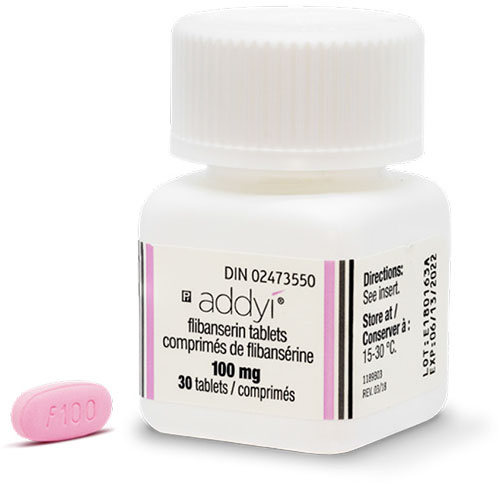
Your Doctor has
Prescribed ADDYI
This is Addyi®  A Little Pink Pill* * Not actual size
A Little Pink Pill* * Not actual size
Why ADDYI?
ADDYI is used for the treatment of premenopausal women with hypoactive sexual desire disorder (HSDD), a condition that has been medically recognized for nearly half a century. It is the most common form of female sexual dysfunction, so you are not alone.
It is prescribed when a woman has had low sexual desire, 75-100% of the time, for a minimum of 6 months, and when the situation causes her difficulty in her relationship. The low sexual desire must not be a result of some other condition (medical or psychological), problems in a relationship, or effects of a medication or other drug substance.
To make sure that none of these factors play a role in your diagnosis, and that ADDYI is right for you, before prescribing, your doctor may have used a checklist that includes a number of questions.
ADDYI cannot be prescribed for everyone. It is prescribed only for women:
-
who have not yet gone through or even started menopause,
-
who have not had problems with low sexual desire in the past, and
- who have low sexual desire regardless of the type of sexual activity, situation, or sexual partner.
What are the ingredients in ADDYI?
There is one medicinal ingredient: flibanserin. The non-medicinal ingredients are: croscarmellose sodium, hypromellose, iron oxide red, lactose monohydrate, macrogol, magnesium stearate, microcrystalline cellulose, talc, titanium dioxide.
ADDYI is available in the form of a 100 mg tablet.
How does ADDYI work?
First of all, it is important to understand what ADDYI does not do. It does not improve sexual performance.
ADDYI is a medicine that adjusts chemicals in your brain. These chemicals, called dopamine and serotonin, are involved in sexual interest and desire. The exact way that ADDYI works, however, is not known.

How to take and store ADDYI
- Take ADDYI exactly as your doctor tells you to: one tablet, once-a-day, and only at bedtime.
- Do not take more than the dose prescribed by your doctor.
- Never take ADDYI at another time of the day. If you take ADDYI at a time other than bedtime you might get low blood pressure, faint (lose consciousness), get very sleepy and possibly injure yourself by accident.
- Talk to your doctor if your symptoms of HSDD have not gotten better after taking ADDYI for 8 weeks.
- If you miss a dose of ADDYI, simply take your next dose at bedtime the next day. Do not take ADDYI the next morning. Do not double your next dose.
- If you think you have taken too much ADDYI, contact your doctor, hospital emergency department or regional Poison Control Centre immediately, even if there are no symptoms.
- Store ADDYI at 15-30°C. Keep out of reach and sight of children. Ask your doctor or pharmacist on how to safely throw away ADDYI tablets.

Are there any reasons why ADDYI should not be taken?
Do not use ADDYI if:
- you are allergic to flibanserin, or any of the other ingredients in ADDYI
- you have liver problems
- you are pregnant or breastfeeding
- you have low blood pressure and you drink alcohol
- you are a man
- you are under 18 years old
- you are over 60 years old
- you take a drug called digoxin or a similar type of drug
- you take certain other medicines that can increase the amount of ADDYI in your blood because that can cause severe low blood pressure, fainting (loss of consciousness) and sleepiness
To ensure that ADDYI is safe for you to take, before taking ADDYI, tell your doctor about all the medicines you take, including any drugs, vitamins, minerals, natural supplements or alternative medicines.
The following is a list of what you should NOT take if using ADDYI:
- certain medicines used to treat HIV-1 infection: amprenavir, atazanavir, fosamprenavir, ritonavir, saquinavir, nelfinavir, indinavir
- certain medicines that you take by mouth used to treat fungal infections: fluconazole, ketoconazole, itraconazole, posaconazole
- certain antibiotics: ciprofloxacin, erythromycin, telithromycin, clarithromycin
- certain medicines used to treat Hepatitis C infection: boceprevir, telaprevir
- certain medicines used to treat high blood pressure, chest pain (angina), or other heart problems: diltiazem, verapamil
- certain medicines used to treat depression: nefazodone
- grapefruit juice
The following may also interact with ADDYI:
- digoxin, a medicine used to treat heart problems
- medicines called proton pump inhibitors used to treat acid reflux such as esomeprazole, omeprazole
- ranitidine, a medicine used to treat stomach ulcers indigestion and heartburn
- selective serotonin reuptake inhibitors such as fluoxetine
- benzodiazepines such as diazepam, lorazepam
- medicines used to treat seizures such as carbamazepine, phenobarbital, phenytoin
- rifampin and rifabutin – medicines used to treat tuberculosis
- etravirine, a medicine used to treat HIV-1 infection
- non-steroidal anti-inflammatory drugs (NSAIDS) such as acetylsalicylic acid (ASA) and ibuprofen
- birth control pills
- alcohol
- certain herbal supplements such as St. John’s Wort, ginkgo, resveratrol
- certain non-prescription medicines such as cimetidine
- sleeping pills such as zopiclone, zolpidem
- certain antihistamines (anti-allergy medicines) such as diphenhydramine
- narcotic pain relievers such as codeine, fentanyl and hydrocodone

Serious warnings and precautions
- ADDYI can cause severe low blood pressure and fainting.
- Take ADDYI at bedtime. If you take ADDYI and feel lightheaded or dizzy, lie down right away. Drinking alcohol close to the time you take ADDYI increases your risk of severe low blood pressure and fainting.
- ADDYI can cause sedation or make you feel very drowsy. After taking ADDYI, do not drive or perform other activities that require full attention until you know how it affects you. Using ADDYI with depressant drugs may increase the risk of sedation or drowsiness.
- If you have liver problems, you should not take ADDYI.
- Before taking ADDYI, tell your healthcare professional about all the medicines you take, including drugs, vitamins, minerals, natural supplements, or alternative medicines. They will tell you if it is safe to take ADDYI.
Other warnings you should know about
To help avoid side effects and to ensure proper use, before taking ADDYI, talk to your doctor about any health conditions or problems you may have, including:
- low blood pressure or any medical condition that can cause low blood pressure
- heart problems
- if you are pregnant or trying to become pregnant
- if you are breastfeeding or planning to breastfeed
- if you drink alcohol
- if you have been told that you have a variation in a liver enzyme called CYP2C19 which makes you process certain medicines poorly
- if you have experienced allergic reactions or sensitivity to any medicines
The effects of ADDYI were not studied in Black or Asian women who are postmenopausal, or postmenopausal women who are underweight.
If you weigh less than 50 kg, there might be a higher risk of certain side effects, including central nervous system depression (sedation or feeling very sleepy), low blood pressure and fainting. Tell your healthcare professional right away if you feel these effects.
If you drink alcohol, wait at least 2 hours after drinking 1 or 2 standard alcoholic drinks* before taking ADDYI at bedtime. If you drink 3 or more standard alcoholic drinks in the evening, skip your ADDYI dose at bedtime. After you have taken your ADDYI at bedtime do not drink alcohol until the following day.
ADDYI can cause low blood pressure, fainting (loss of consciousness) and sleepiness. Using ADDYI with drugs (like diphenhydramine, opioids, hypnotics and benzodiazepines) that slow down your central nervous system can increase this risk. This can affect your ability to drive or use machines. You should wait at least 6 hours after taking ADDYI before driving or using machines. You should be extra careful when driving the morning after taking ADDYI until you know how it affects you.
The risk of low blood pressure and fainting is increased if ADDYI is taken during waking hours, or if more than the recommended amount is taken. This is why you must take ADDYI at bedtime only, and exactly as your doctor tells you to. If you take ADDYI and feel lightheaded or dizzy, lie down right away. Get immediate medical help if the symptoms do not go away, or ask someone to get immediate medical help for you should you faint (lose consciousness). If you have fainted after using ADDYI, tell your doctor as soon as you can.
Anaphylactic reactions (severe allergic reactions) may happen while taking ADDYI. Tell your doctor right away if you have a hard time breathing or a serious rash.
* Examples of 1 standard alcoholic drink include: one 12-ounce regular beer (5% alcohol); 5 ounces of wine (12% alcohol); 1.5 ounces of distilled spirits or shot (40% alcohol).
What are the possible side effects of using ADDYI?
Every medicine is associated with a list of possible side effects, but this does not mean that these side effects will be experienced by all patients. Some side effects occur more frequently, while others are less frequent. Some are more serious, and others less.
Side effects that you may experience while taking ADDYI:
- dizziness
- vertigo
- nausea, vomitting
- muscle spasms
- swelling of hands and legs
- sleepiness, tiredness
- night sweats
- difficulty falling asleep or staying asleep
- dry mouth
- anxiety
- diarrhea
- constipation
- indegestion
- abdominal pain
- headache
- abnormal dreams
- rash
- acne
If, as a result of taking ADDYI, you experience any of the following symptoms, tell your doctor:
- urinary tract infection (infection in urinary system including kidneys, ureters, bladder and urethra), with symptoms including pain or burning sensation while urinating, frequent urination, blood in urine, pain in the pelvis, strong smelling urine, cloudy urine, or
- low blood pressure and its effects to any degree (blurred vision, dizziness or light-headedness, feeling tired, nausea).
If, as a result of taking ADDYI, you experience any of the following serious symptoms and their effects, stop taking ADDYI and get immediate medical help:
- fainting (loss of consciousness),
- hypersensitivity (severe allergic reaction) with effects such as fever, skin rash, hives, itching, swelling, shortness of breath, wheezing, runny nose, itchy, watery eyes,
- mental health changes such as dissociation from reality, hallucination, intensely excited mood, racing thoughts, or
- tachycardia (abnormally fast heartbeat) with effects such as chest pain, fast pulse, light- headedness, racing or irregular heartbeat, shortness of breath.
This is not a complete list of side effects. If you have a troublesome symptom or side effect that is not listed here, or if any side effect becomes bad enough to interfere with your daily activities, talk to your doctor or pharmacist.
If you would like to have a printed summary of some of the important information to remember, please print the Patient Handout.
Reporting Side Effects
You can report any suspected side effects associated with the use of health products to Health Canada by:
visiting the Web page on Adverse Reaction Reporting
(https://www.canada.ca/en/health-canada/services/drugs-health-products/medeffect-canada.html)
for information on how to report online, by mail or by fax; or
calling toll-free: 1-866-234-2345.
NOTE: Contact your health professional if you need information about how to manage your side effects. The Canada Vigilance Program does not provide medical advice.




